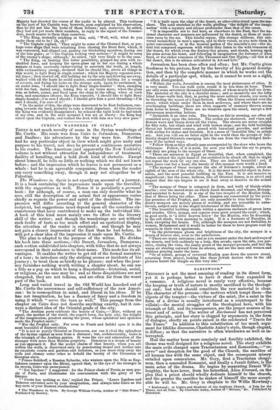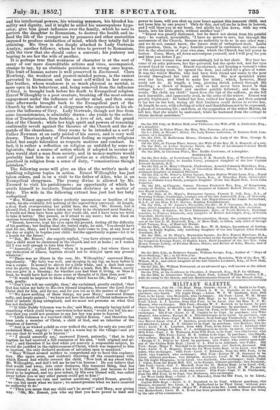EARLSWOOD. * TICEOLOGY is not the most amusing of reading in
its direct form, yet it is perhaps better to have it short than expanded in a romance. A religious novel is rarely very effective, because the keeping or truth of nature is mostly sacrificed to the theologi- cal end; but what should constitute the raw material is clear. The character of the persons—the motives which tempt them—the objects of the tempter—the virtues of the saint, (for a saint in the form of a divine is usually introduced as a counterpart to the villain)—the mental struggles of the theological hero, with his triumph or fall, and its consequences' are the proper sources of in- terest and of action. The writer of Earlswood has not perceived this principle, and her story is clogged by arguments in the form of dialogue, chiefly on points raised in the celebrated "Tracts for the Times." In addition to this substitution of too much argu- ment for lifelike discourse, Charlotte Anley's style, though elegant, is diffuse ; so that the narrative is often wiredrawn as well as in- terrupted. Had the matter been more concisely and forcibly exhibited, the theme was well designed for a religious novel. The story exhibits the main evils charged upon Tractarianism and Romanism,—" re- serve" and deception for -the good of the Church, the sacrifice of all human ties with the same object, and the consequent misery entailed upon connexions. Mr. Grey, first a Tractarian clergy- man, then a concealed Romanist, and finally a Jesuit father, is the main actor of the drama. He begins by separating Ernest Wil- loughby, the hero lover, from his betrothed, Alice Everard, on the plea that a priest should wholly dedicate himself to the church, and the greater the sacrifice he makes of himself the more accept- able he will be. Mr. Grey is chaplain to Sir Willis Mowbray ; • Earisweea; or Lights and Shadows of the Anglican Church. A Tale for the
Times, and all Time. By Charlotte Anley, Author of "Miliam," Pc.c. Published by Hatchard.
and his intellectual powers, his winning manners, his blended hu- mility and dignity, and it might be added his unscrupulous hypo- crisy, give him great influence over the family, which he uses to pervert the daughter to Romanism, to destroy the health and in- deed the the life of the younger son by penances and other austerities imposed to produce satisfaction of mind, which they totally fail in attaining. Mr. Grey is also deeply attached to Lady Gertrude Austyn, another follower, whom he tries to pervert to itomanism, with the view that she should enter a convent; his jealousy not bearing to see her the wife of another.
It is perhaps true that weakness of character is at the root of many of our more discreditable actions and vices, accompanied, strange to say, by an obstinate persistence in wrong once begun. This trait of human nature is well preserved in Earlswood. Clara Mowbray, the weakest and poorest-minded person, is the easiest perverted to ltomanism and the most self-willed in her course. Her brother, whose weakness is as much physical as mental, is more open in his behaviour, and, being removed from the influence of Grey, is brought back before his death to Evangelical religion. Ernest Willoughby is a poor creature, breaking off the most solemn engagement under the influence of another mind, and then some time afterwards brought back to the Evangelical part of the Church by the influence of a clergyman who supersedes in his ab- sence the influence of Grey. Lady Gertrude though not free from some inconsistencies, is admirably drawn : die yields to the seduc- tion of Tractarianism, from fashion, a love of art, and the grand idea of the Church ; while her high spirit and powers of reasoning continually revolt against the theories of the Church and the de- mands of the churchmen. Grey seems to be intended as a sort of Father Newman at an early period of his career, and is very well drawn. There is plenty of Protestant feeling ass religious belief, but ample toleration as respects motives arigacrOinduct. In fact, it is rather a reflection on religion as unfolded by some re- ligionists, that a course of action which if adopted in secular af- fairs would shut a man from society, and in money-matters would probably land him in a court of justice as a swindler, may be practised in religion from a sense of duty, "conscientious though mistaken."
The following scene will give an idea of the writer's mode of handling religious topics in action. Ernest Willoughby has just taken orders, and is on a visit to the father of Alice, who is an Evangelical clergyman. The young divine is allowed by Mr. Everard to visit his parishioners ; an opportunity of which he avails himself to inculcate Tractarian doctrines as a matter of duty. The wife in the following extract has just lost her baby unbaptized.
"Mrs. Wilmot appeared either perfectly unconscious or heedless of his words, for she evidently felt nothing of the reproof they conveyed. At length, a deep flush overspreading her pallid face, she said, Mr. Ernest, had it pleased God, I meant to have taken my baby to be christened next Sunday ; it would not then have been quite five weeks old, and I have been too weak to take it before.' She paused, as if afraid to say mere; but she fixed an anxious beseeching look on the young clergyman.
"Ernest, however, kept his eyes upon the ground, feeling all the difficulty of his position but finding that she waited reply, he said, • You should have sent for me, dory, and I would willingly have come to you, at any hour of the day or night, to baptize your child : but the opportunity is gone—let it be a lesson for the future.
"'But, But, Mr. Ernest,' she eagerly replied, you have always yourself said, that a child must be christened in the church and not at home ; so I waited till I was well enough to take him there.'
"Assuredly,' replied Ernest, when it is possible ; but where there is any indication of illness, baptism should not be delayed upon any ground whatever.'
" ' There was no illness in the case, Mr. Willoughby,' answered Mary, impatiently. 'My baby was well, and sleeping in my lap, an hour before it was a corpse. It seemed to shiver for a little while, and a dark look came over its pretty face, and then it died off like a lamb. But, Mr. Ernest, surely you can give it a blessing ; for whether you had blest it living, or bless it dead, he would have had no more sense or thought of it then than now.'
"'It would be impious to bless a thing which has no life, Mary,' said Er- nest, gently. "'Can't you tell me outright, then,' she exclaimed, greatly excited, that God has taken my baby to His own blessed kingdom, because the Lord Jesus Christ died for him, and for me, and for you too as to the matter of that?' "'We know nothing of these things, my poor Mary,' answered Ernest sadly, and deeply pained ; 'we know not how the death of Christ influences the state of infanta dying unbaptized, and we must not presume on what God has not declared.'
"If little Neddy Coleman was to die,' said Mary, strangely laying hold of something which could bring conviction to her mind, would you tell his mo- ther that you could not presume to say her boy was gone to heaven ?'
"'Little Coleman is a baptized child,' replied Ernest, and therefore has been made a member of Christ, a child of God, and an inheritor of the kingdom of heaven.' "And is as wicked a child as ever walked the earth, for only six year old!' exclaimed Mary, angrily ; there isn't a worse boy in the village—and yet you say that he would go to heaven ! ' "'I should assuredly arty,' answered Ernest, patiently, that in holy baptism he had received a full remission of his sins, 'both original and ac- tual' '• and therefore if he died while yet scarcely a responsible subject, he would die justified in the righteousness of Christ, which was imparted to him in baptism, the only declared medium of salvation open to mankind.' "Mary Wilmot seemed neither to comprehend nor to heed this explana- tion. She again arose, and suddenly throwing off the counterpane with which Ernest had wholly covered the child, 'Now look at my sweet babe, Mr. Willoughby, and don't tell me he isn't in heaven ! Do you believe that God would cast away, into outer darkness, this innocent thing, that has never sinned a sin, and yet take a bad boy to Himself, just because he had lived to be baptized, and my poor infant, by His own blessed will, was called away before you or any other parson could get to him ? ' "'Mary, these are vain and useless questions,' replied Ernest, gravely : we can but speak what we know ; we cannot promise what we have received no authority to do.'
"'Then you mean that my child can't be saved I ' said Mary, now giving Way. 'Oh, Mr. Ernest, you who say that you have power to bind and ' power to loose' will you shut up your heart against this innocent child, and not loose him by one. prayer ! Only do this, and tell me he is free in heaven, and I will bless you in my heart, and gladly lay him down, with my own hands, into his little grace without another tear!'
"Ernest was greatly distressed, but he dared not shrink from his painful
duty : he replied, mournfully, have no power to save, but through the sacraments of the Church, because no authority to do so in any other way; and we do not, cannot know, the future state of unbaptized souls. Leave this question, then, in hope; humble yourself in confession, and take com- fort in the absolution of your own sins, which the Church has full power to , bestow. Come, Mary, sit down and compose yourself, and twill pray for you and bless you before I go.' "The poor woman was now unresistingly led to her chair. Her face be- came of an ashy paleness, her lips quivered, but she spoke not, and her eyes fixedin vacancy. Ernest was alarmed, and hearing a women's voice in the adjoining room, he opened the door, and called for a glass of water. It was the widow Martin, who had been both friend and nurse to the poor invalid throughout her trial and distress. She now sprinkled water over her face, and tried to make her drink ; which, however, Mary could not do. At length, a long, piercing shriek echoed through the dwelling ; a shriek of despair, such as had never been heard in that , cottage before ! Another and another quickly followed ; and then the words, My child, my child !' burst from the lips of the sufferer, as she fell back insensible, and apparently dead, in the arms of the widow. Ernest was greatly frightened : he bathed her face, rubbed her hands, and then assisted to lay her on the bed, trying all that kindness could devise to revive her. At length he saw, with a feeling of relief and thankfulness not to be expressed, a gleam of returning life ; and then, at the suggestion of the widow Martin, he left her, that she might be undressed, while he hastened from the cottage to obtain medical assistance."



























 Previous page
Previous page